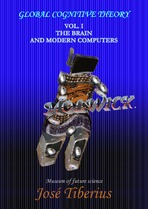3. EVOLUTIONARY PSYCHOLOGY
The main conclusions, which also appear in the corresponding section of the EDI study, are the following:
The hereditary nature of relational intelligence
The significance of the less powerful gene regarding the concept of conditional intelligence
Central goals of the sexual differentiation
The existence of a teleological or finalist evolution
The intuitive vision of the brain's functions and cognitive psychology aspects of the Global Cognitive Theory is difficult to summarize. The index could be a good summary.
3.a) General psychology
The description of how intelligence and memory operate could help to understand better human behavior.
Cognitive psychology may help to be somewhat more conscious of the brain limits and more prudent in the fixation of individual objectives.
The different ways the individual decision-making processes developed can explain the apparent change of individual opinion in specific instances; particularly when carried out in a centralized or democratic way regarding the cells or groups of cells.
The knowledge of the decision-making process should imply, to a certain degree, self-education to avoid losing control of the will.
A little bit of humor is never wrong, above all when saying something like 'it seems that we do not exist from a strictly scientific point of view'; or that the human being, more than a living being, strictly speaking, is configured like a vital impulse system.
The concept of temporary discontinuity of existence is a consequence of evolutionary psychology and the stated dual nature of living beings.
3.b) Memory and education
-
The tendency of using standard memory should increase as much as possible because of its enormous potential in comparison to mathematical one.
Currently, there is a tendency to practice and use math memory to develop it.
If new approaches in cognitive psychology are correct and this capacity is configured mainly by genetic determining factors, students' efforts could be genuinely counterproductive given that these efforts generate much tension and prevent the desirable use of standard memory.
One more element to consider is the functional parallelisms between computers and the human brain.
The desired change towards the use of standard memory also comes from computers and communication, providing a large quantity of information in real time.
Education should promote people's capacity for managing and processing the large quantity of available information.
The effects of sleeping and dreams on memory's operation should allow students to do not make the error of studying instead of sleeping.
The same reasoning applies to other types of behavior concerning the capacity to memorize.
Higher knowledge of the memory manager methods helps to educate studying habits.
3.c) Evolution of the human brain
If the parallelism between computers evolution and brain evolution are deeply rooted, an interesting consequence in evolutionary psychology would be the confrontation between random mutations and guided improvements.
Likewise, the evolution of computers reminds of the proposals put forth by the Conditional Evolution of Life. The same comparison will lead to reconsider the role of sexual differentiation in the evolutionary process: females seem not to modify genes after their early formation, we may find that they have specialized in “hardware”; and males, on the other hand, in “software.” Both, as we all know, interrelated and of similar reputation.
This vision of the brain's functions creates many questions in the specific field of evolutionary psychology: are genes the most compressed expression of our memory? Does something like a compiler exist in the human body, and where would it be found? When is genetic information updated? Why is short-term memory cleaned in sexual relations? What percentage of genetic information modifies in each generation?
In this sense, a compression mechanism and information codification could exist for its multiple transmissions; once modified by the sub-system of the memory's genetic information.
Finally, artificial intelligence could be as a machine's system of decisions, created or not by human beings, and having the characteristics of a vital impulse system.
* * *
When Globus finished the book, he received from the future
an heyelogic transversal resonance of the
para-cerebellum of Darwinout,
sent by his friend José.

